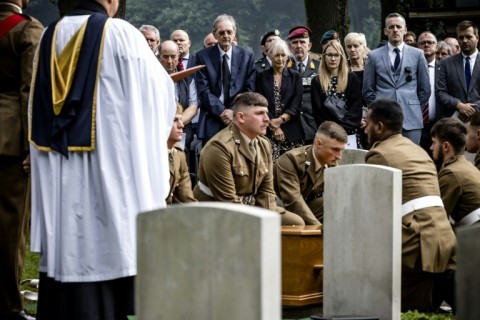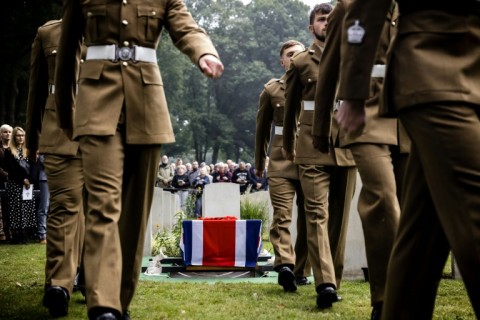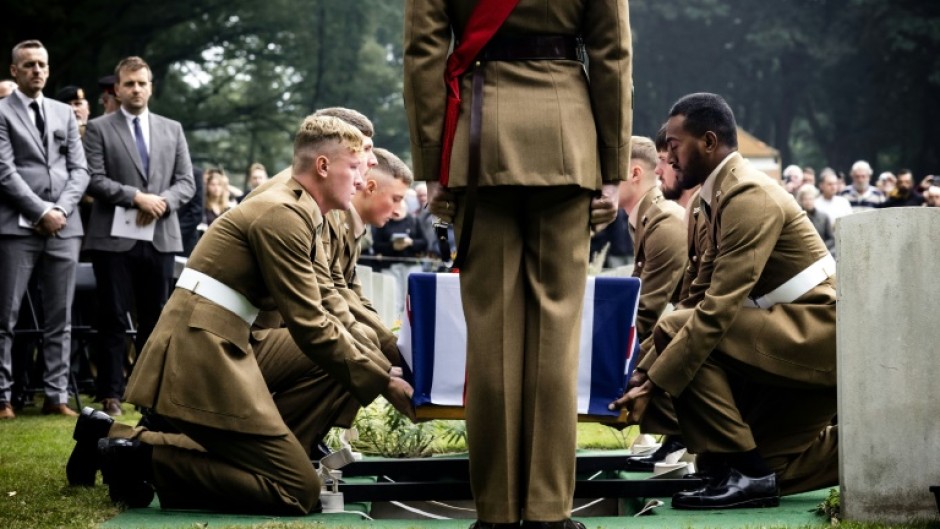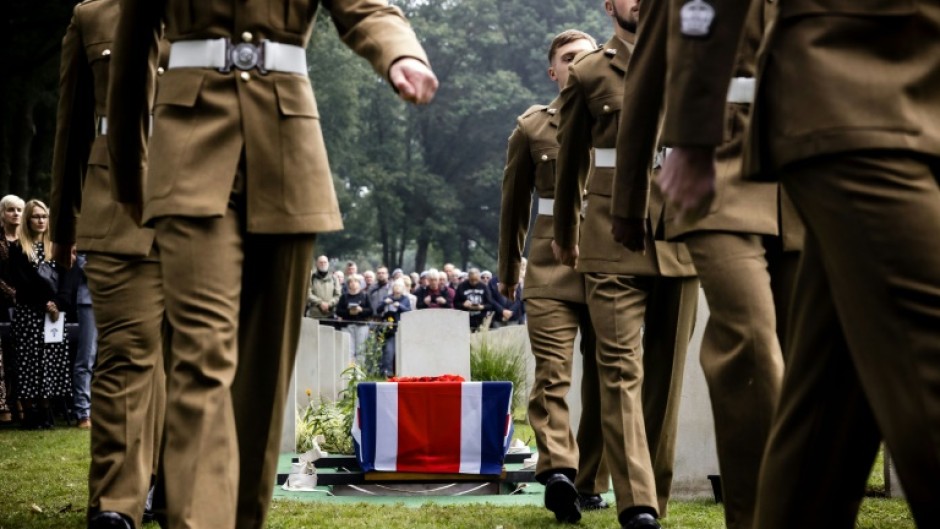With full military honours and proud family members looking on, two Allied servicemen were laid to rest Wednesday, 80 years after giving their lives to liberate Europe from the Nazis.
Private Henry Moon from Yorkshire in northern England and South African Lieutenant Dermod Anderson died in the Allied WWII effort to open up an invasion route to Nazi Germany -- operation Market Garden.
Six young pallbearers in military uniform marched through the war cemetery in Oosterbeek, eastern Netherlands, bearing Moon's coffin draped in the Union Jack flag.
A poppy wreath sat on top of the coffin, as well as a portrait of the fresh-faced Moon, killed by a German mortar shell on October 1, 1944, aged just 21.
Hundreds of locals and well-wishers joined the family and top British and Dutch military brass to pay respects to Moon, as flags from the two countries flew at half-mast.
"Private Moon fought for his country's freedom, in fact Europe's freedom," said military chaplain Robert Desics, leading the service.
Pallbearers lowered the coffin into the ground as a lone bugler sounded the Last Post and a volley of shots from a full military gun salute cracked through the air.
At the moment the coffin entered the grave, the sun finally broke through the early-morning haze for the first time of the day.
- 'Truly humbled' -
Moon's great nephew David Snowdon said the family was "truly humbled" by the attention and the ceremony.
"It's extraordinary. There are hundreds of people. We were expecting about 20. It just shows that we don't forget those who died during the war," Snowdon, a 41-year-old police officer, told AFP.
Born on Christmas Eve 1922, Moon served with the Yorkshire Regiment ("The Green Howards"), taking part in the invasion of Sicily from North Africa in 1943.
Wounded, he returned to England but recovered in time for the D-Day landings, landing on Gold Beach on June 6, 1944.
Moon fought his way through France and Belgium and crossed into the Netherlands on September 17, the first day of Operation Market Garden, one of the most controversial episodes of WWII.

His unit took up position just south of Arnhem and he died a fortnight later in a German mortar bombardment.
"He never had any children of his own. He never got to that point. He never got to have a family. He never got to live a life beyond the age of 21," said Snowden.
"The fact that he's still got people... who are trying to bring about all this so that we can actually get him buried, get him the burial he deserves, it's incredible."
Moon's remains were found during roadworks while Anderson's were found near an old church, where he had been killed. Relatives gave DNA samples to identify them.
Anderson was born in Natal in 1914, leaving South Africa to study architecture in England in the 1930s.
When war broke out, he became a glider pilot, also taking part in the Normandy landings.
Anderson landed in the Netherlands on September 18 as part of Operation Market Garden, but died a week later from a German mortar shell.
His commanding officer wrote to his family praising his bravery. Anderson had risked his life to carry wounded people to safety in a jeep under heavy German fire.
- 'A bridge too far' -
Events are taking place throughout the Netherlands this month to commemorate Market Garden, arguably the most disastrous airborne operation of World War II.
More than 1,400 Allied soldiers died and 6,600 were captured in the ill-fated plan to seize bridges in the Netherlands in mid-September 1944.
Allied commanders had hoped the operation would give them a quick way of ending war in Europe, opening up an invasion route to Berlin.

However, thousands of parachutists were repelled by strong German opposition and Arnhem was almost totally gutted in the fighting.
The Allied troops were forced to retreat and the Nazis exacted a cruel punishment on the Dutch, cutting off food supplies, sparking thousands of deaths by starvation.
The operation got the Hollywood treatment in the 1977 war epic "A Bridge Too Far" directed by Richard Attenborough and starring Sean Connery, James Caan and Robert Redford.
Tracey Bowers, head of the commemorations team, said as many as 500,000 soldiers from the World Wars remained unidentified. Bodies are discovered on a daily basis, she told AFP.
"From the millions that died in that war, there's so many different stories involved, but this is just one of them and we got to find out about it today," said Snowdon.
By Richard Carter


